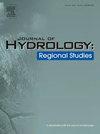Water-rights enforcement in Abshar Irrigation District, Central Iran: Leveraging water accounting for improved standard operating procedures
IF 4.7
2区 地球科学
Q1 WATER RESOURCES
引用次数: 0
Abstract
Study Region
The Abshar irrigation district, located in a central arid plateau in Iran, faces drought challenges, and the current operating system managing surface water distribution among stakeholders is at risk of water supply shortages.
Study Focus
The research aims to develop a more accurate and effective framework for assessing water rights and tailoring Standard Operating Procedures (SOP). This involved quantifying surface and groundwater contributions and adapting the System of Environmental-Economic Accounting (SEEA)'s Physical Supply Use Tables (PSUTs).
New Hydrological Insights for the Region
Hydrological assessments, including surface and groundwater resource allocation and hydraulic analysis, were conducted. Surface water distribution was simulated for a one-year operation under various drought-induced scenarios, and groundwater extraction was quantified for individual farmer cooperatives. The modified PSUTs were populated with data from different drought scenarios to identify discrepancies between historical and scrutinized water rights, leading to refined SOPs. The findings highlight the limitations of existing manual-based operating systems in meeting water rights demands during droughts. The proposed methodology offers practical implications for enhancing water resource management efficiency and sustainability in irrigation districts worldwide.
伊朗中部阿布沙尔灌溉区水权执行:利用水会计改进标准操作程序
Abshar灌区位于伊朗中部干旱高原,面临干旱挑战,目前管理各利益相关者之间地表水分配的操作系统面临供水短缺的风险。研究重点该研究旨在制定一个更准确和有效的框架来评估水权和制定标准操作程序(SOP)。这包括对地表水和地下水的贡献进行量化,并采用环境经济核算系统(SEEA)的物质供应使用表(PSUTs)。进行了包括地表水和地下水资源分配和水力分析在内的区域水文评估。模拟了不同干旱情景下为期一年的地表水分布,并量化了个体农民合作社的地下水采掘量。修改后的psut中填充了来自不同干旱情景的数据,以确定历史和审查后的水权之间的差异,从而得出改进的sop。研究结果突出了现有的基于手册的操作系统在干旱期间满足水权需求方面的局限性。所建议的方法对提高全世界灌区的水资源管理效率和可持续性具有实际意义。
本文章由计算机程序翻译,如有差异,请以英文原文为准。
求助全文
约1分钟内获得全文
求助全文
来源期刊

Journal of Hydrology-Regional Studies
Earth and Planetary Sciences-Earth and Planetary Sciences (miscellaneous)
CiteScore
6.70
自引率
8.50%
发文量
284
审稿时长
60 days
期刊介绍:
Journal of Hydrology: Regional Studies publishes original research papers enhancing the science of hydrology and aiming at region-specific problems, past and future conditions, analysis, review and solutions. The journal particularly welcomes research papers that deliver new insights into region-specific hydrological processes and responses to changing conditions, as well as contributions that incorporate interdisciplinarity and translational science.
 求助内容:
求助内容: 应助结果提醒方式:
应助结果提醒方式:


